GUEST DEEPSKY ASTROPHOTOGRAPHY
Last updated: 28 December 2000
GUEST DEEPSKY ASTROPHOTOGRAPHY |
Some ETX users have sent me examples of their astrophotography. If you have some examples you would like included here please send me a description of how you made the astrophotos and a copy of the images as GIF or JPEG files (due to internet email gateway issues, please send only one image file per message). Send to etx@me.com. Alternatively, if you have created your own web page with your examples please let me know and I'll include a link to your site.
| gerald_wechselberger@at.ibm.com (Gerald Wechselberger) [28 Dec 00] |
|---|
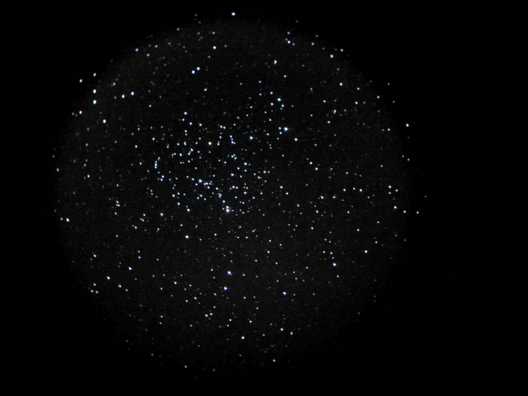 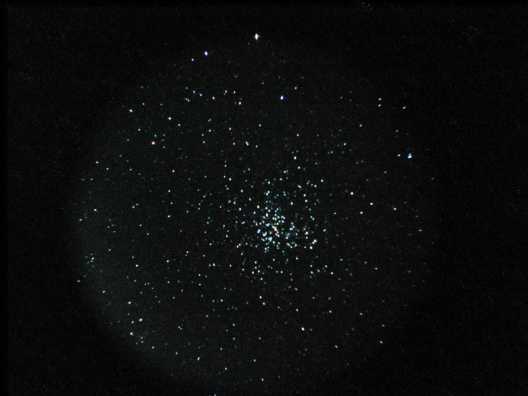 |
|
[Top] Please find attached a CCD picture of the Open Cluster M35 from December
23rd.
I used an Olympus Digitalcamera Z2020 attached to the ETX 125EC with 40mm
eyepiece projection, NO GUIDING!
At minus 8 Degree Celsius outside temperature the ETX drive worked nice and
surprisingly the Olympus showed only small thermal noise and was easy to
handle on the ETX for other deep sky images too.
Picture is made out of 4 'darkframe subtracted' images stacked with
Micrografix Publisher , each image has an exposure time of 16 Seconds at
400 ASA. [Bottom] Please find attached a CCD picture of the Open Cluster M37 also from December 23rd. Pictured with an Olympus Digitalcamera Z2020 attached to the ETX 125EC with 40mm eyepiece projection, NO GUIDING! At minus 8 Degree Celsius outside temperature the ETX drive worked nice and surprisingly the Olympus showed only small thermal noise and was easy to handle on the ETX for other deep sky images too. Picture is made out of 4 'darkframe subtracted' images stacked with Micrografix Publisher , each image has an exposure time of 16 Seconds at 400 ASA. Feel free to put this image on your guest ETX-Page. Thanks for keeping the ETX issue all time update. Its always very interesting and useful! |
| gerald_wechselberger@at.ibm.com (Gerald Wechselberger) [26 Dec 00] |
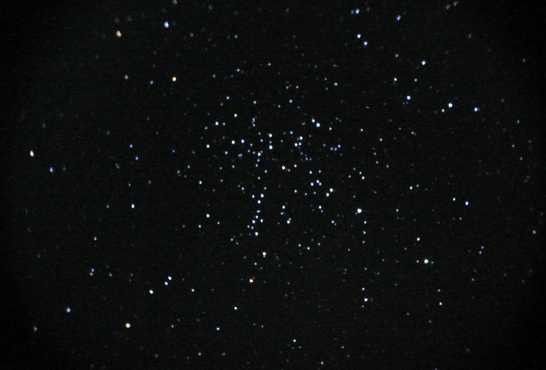 |
|
Please find attached a CCD picture of the Open Cluster M38 from December
23rd. This picture was made with an Olympus Digitalcamera Z2020 attached
to the ETX 125EC with 40mm eyepiece projection, NO GUIDING!
At minus 8 Degree Celsius outside temperature the ETX drive worked nice and
surprisingly the Olympus showed only small thermal noise and was easy to
handle on the ETX for other deep sky images too.
Picture is made out of 3 'darkframe subtracted' images stacked with
Micrografix Publisher , each image has an exposure time of 16 Seconds at
400 ASA.
Feel free to put this image on your guest ETX-Page. Thanks for providing
such a large volume of ETX infos alive und updated all the time.
|
| gerald_wechselberger@at.ibm.com (Gerald Wechselberger) [6 Dec 00] |
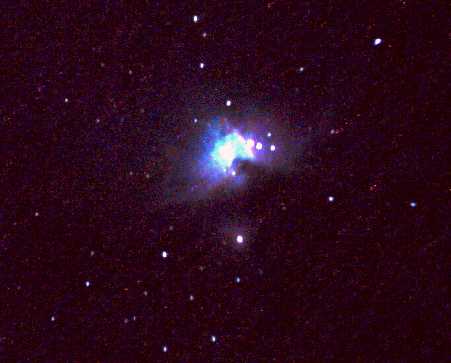 |
|
Please find attached a picture of the Orion nebula from November 27th
22:27:36 - 22:35:07 UT. This picture was made with an Olympus
Digitalcamera Z2020 attached to the ETX 125EC.
Its my first try to make stacked images. Picture consists of 6 Images
stacked, each images has an Exposure time of 16 Seconds, 40mm Eyepiece
projection, NO GUIDING!
Images were 'darkframe subtracted' and stacked with Micrografix Publisher.
This first try convinces me that you dont need an expensive and hard to
handle cooled Camera to make basic
pictures of bright Deep Sky objects. (Stars up to Magnitude 11 on this
picture visible).
Feel free to put it on your guest ETX-Page. Thanks for providing such a
large volume of ETX infos
alive und updated all the time.
|
| M&J Bareket (bareketj@internet-zahav.net) [15 Nov 00] |
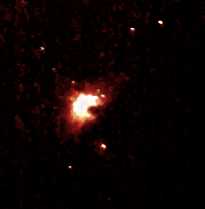 |
|
M42- I used my 90ETX in prime focus.
400 asa film negative that developed by me
the exposure time was 3 minutes & 20 seconds.
It didn't have any guiding, there for the telescope
is only tracking with his motor without any
correciont by the photograpehre.
I gues the etx is not design for deep sky
photography (I have the one of the first meades etx modle)
or I just dont had lucky enuth
enjoy- shalom to all
|
| Gerald Wechselberger (gerald_wechselberger@at.ibm.com) [29 Sep 00] |
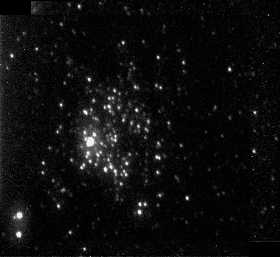 |
|
Please find attached an image of Open Cluster M11 made out of 2 pictures.
This shots were made with a
Cookbook CCD CB245 Digitalcamera attached to the ETX Main Focus.
Pictures were made July 31st at 23:20:56 and 23:14:11, Exposure time each
16 seconds, Unguided pictures!!
Image combined with Registri and improved with Micrografix Publisher.
If you put this image on your site, this would help my ego again.
|
| M&J Bareket (bareketj@internet-zahav.net) [12 Sep 00] |
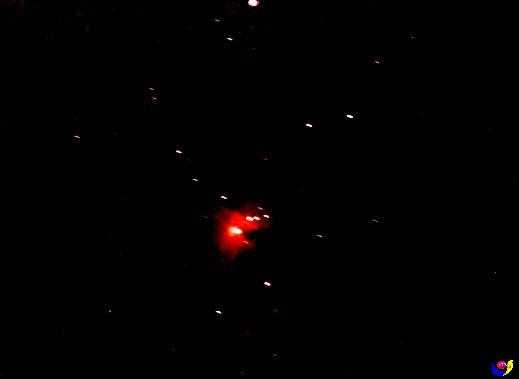 |
|
I took that shot (M42) using my ETX (90 mm) and a 800asa film.
it was just for fun, to check the motor tracking accuracy.
the exposure was 2 minuts at prime focus.
not that good shot I believe.
but still... I like it !
|
| Jim Berry (jim@emmgraphics.com) |
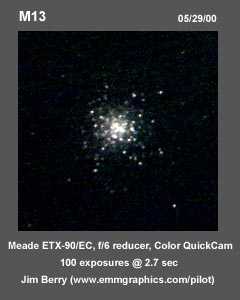 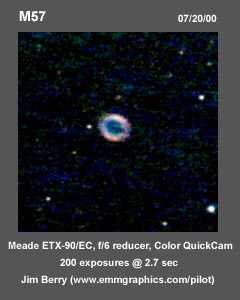 |
|
I thought you might like these. They were taken with a stock ETX-90/EC with
a slightly modified (taken out of the "egg" and put into a square project
box with a cooling fan) Color Quickcam.
My web site has more info: >www.emmgraphics.com/pilot
|
| Gerald Wechselberger (gerald_wechselberger@at.ibm.com) |
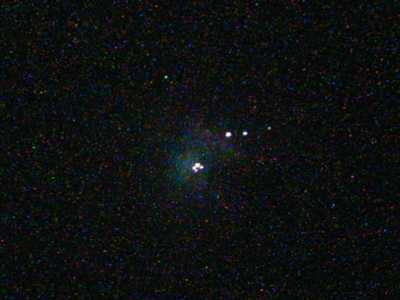 |
|
As the chip of the Olympus Digital Camedia 2020Z is very light sensitive you can do star
pictures up to a level of 4 Seconds without any special treatment. Here's an
example of the
Orion Central trapezium stars from February 6th. Eyepiece
projection with 26mm ocular and the ETX125EC.
|
| M&J Bareket (bareketj@internet-zahav.net) |
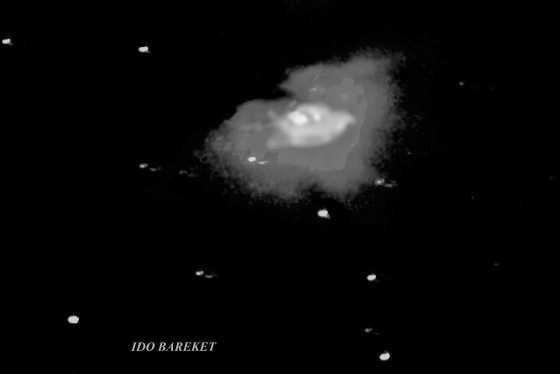 |
| Hellow to al ETX users! :) My name is IDO, I'm 16 years old, I took that photo of M42 shot, 1600asa film (AGFA I think) the pic photographed with ETX astronomy telescope. , it was exposured 7-9 minuts. The motor was working. I have took all my pics with pentax k-1000. |
See the Guest Deep Sky for photos posted in 2001.
See the Guest Deep Sky Archive 1999 for photos taken 1999 and earlier.
Return to the top of this page.
Go back to my ETX Home Page.